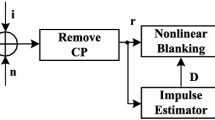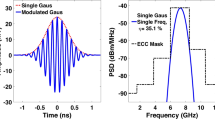Abstract
Ultra-wideband (UWB) systems impose a stringent requirement on the jitter performance of the system clock. So far, only the effect of white Gaussian timing jitter has been considered in the literature via numerical simulation. However, practical clocks commonly exhibit colored jitter. In this paper, we first investigate the bit error rate (BER) performance of a single-user binary pulse position modulation UWB system subjected to white and colored Gaussian jitter. It is shown that colored jitter degrades BER performance much more than white jitter, and the extent of degradation increases as the jitter bandwidth decreases. Motivated by this result, we then propose a new jitter compensation scheme to improve the BER performance under colored jitters with small jitter bandwidth, in which each information-bearing data symbol is coupled with a pilot symbol. The proposed scheme attempts to track first the jitter for the current pilot symbol by making use of the pulse-template correlation function. This information is then used together with the known clock jitter bandwidth and jitter root-mean-square (RMS) value to detect the current data symbol according to the maximum likelihood criterion. Simulation results show that the algorithm is effective in improving the BER performance for colored jitters with small jitter bandwidth.
Similar content being viewed by others
References
M.Z. Win and R.A. Scholtz, “Characterization of Ultra-wide Bandwidth Wireless Indoor Channels: A communication-theoretic view”, IEEE J. Sellct. Aneas Commun., Vol. 20, pp. 1613–1627, Dec. 2002.
F. Ramirez-Mireles, “On The Performance of Ultra-wideband Signals in Gaussian Noise and Dense Multipath”, IEEE Trans. Veh. Technol., Vol. 50, pp. 244–249, Jan. 2001.
J.D. Choi and W.E. Stark, “Performance of Ultra-wideband Communications with Suboptimal Receivers in Multipath Channels”, IEEE J. Select. Areas Commun., Vol. 20, pp.1754–1766, Dec. 2002.
F. Ramirez-Mireles, “Signal Design for Ultra-wideband Communications in Dense Multipath”, IEEE Trans. Veh. Technol., Vol. 51, pp. 1517–1521, Nov. 2002.
R.A. Scholtz, “Multiple Access with Time-Hopping Impulse Modulation”, in Proc. IEEE MILCOM 1993, Oct. 1993, Vol. 2, pp.447–450.
M.Z. Win and R.A. Scholtz, “Ultra-wide Bandwidth Time-hopping Spread-Spectrum Impulse Radio for Wireless Multiple-access Communications”, IEEE Trans. Commun., Vol. 48, pp. 679–691, Apr.2000.
L. Huang and C.C. Ko, “Performance of Maximum-likelihood Channel Estimator for UWB Communications”, IEEE Commun. Lett., Vol. 8, pp. 356–358, June 2004.
L. Yang and G.B. Giannakis, “Optimal Pilot Waveform Assisted Modulation for Ultrawideband Communications”, IEEE Trans. Wireless Commun., Vol. 3, pp. 1236–1249, Jul. 2004.
L. Yang and G.B. Giannakis, “Analog Space-time Coding for Multiantenna Ultra-wideband Transmission”, IEEE Trans. Commun., Vol. 52, pp. 507–517, Mar. 2004.
E. Fishler and H.V. Poor, “Low-complexity Multiuser Detectors for Time-hopping Impulse-radio Systems”, IEEE Tran. Signal Processing, Vol. 52, pp. 2561–2571, Sept. 2004.
M. Hamalainen, V. Hovinen, R. Tesi, J.H.J. Iinatti, and M. Latva-aho, “On The UWB System Coexistence With GSM900, UMTS/WCDMA, and GPS”, IEEE J. Select. Areas Commun., Vol. 20, pp.1712–1721, Dec. 2002.
L. Zhao and A.M. Haimovich, “Performance of Ultra-wideband Communications in the Presence of Interference”, IEEE J. Select. Areas Commun., Vol. 20, pp. 1684–1691, Dec. 2002.
W.M. Lovelace and J.K. Townsend, “The Effects of Timing Jitter and Tracking on the Performance of Impulse Radio”, IEEE J. Select. Areas Commun., Vol. 20, pp. 1646–1651, Dec. 2002.
J.A. Mcneill, “A Simple Method for Relating Time and Frequency-domain Measures of Oscillator Performance”, in Proc. Southwest Symposium on Mixed-Signal Design, pp.7–12, Feb. 2001.
F. Ramirez-Mireles and R.A. Scholtz, “System Performance Analysis of Impulse Radio Modulation”, in Proc. IEEE RAWCON 1998, pp.123–127, Aug. 1998.
D. Kelly, S. Reinhardt, R. Stanley, and M. Einhorn, “PulsON Second Generation Timing chip: Enabling UWB Through Precise Timing”, in Proc. IEEE UWBST 2002, pp. 117–122, May 2002.
R.T. Hoctor and H.W. Tomlinson, “An Overview of Delay-Hopped, Transmit-Reference RF Communications”, in G.E. Research and Development Center, Technical Information Series, pp. 1–29,2002.
Author information
Authors and Affiliations
Corresponding author
Additional information
Lei Huang received the B.Sc. degree from Xi'an Jiaotong University, China, in 1993, the M. Sc. degree from South China University of Technology in 1996, and the Ph.D. degree from Victoria University of Technology (VUT), Australia, in 2003, all in Electrical Engineering. From 1996 to 1999, he was a Lecturer at South China University of Technology. From March 2003 to December 2005, he was with National University of Singapore as a Research Fellow. Since January 2006, he has been working in Panasonic Singapore Laboratories as an R & D Engineer. His research interests focus on physical layer aspects on wireless communication systems, especially CDMA, ultrawideband and millimeter wave communications.
Rights and permissions
About this article
Cite this article
Ko, C.C., Huang, L. & Poh, B.H. Effect and Compensation of Colored Timing Jitter in Pulsed UWB Systems. Wireless Pers Commun 40, 19–33 (2007). https://doi.org/10.1007/s11277-006-9097-7
Published:
Issue Date:
DOI: https://doi.org/10.1007/s11277-006-9097-7




